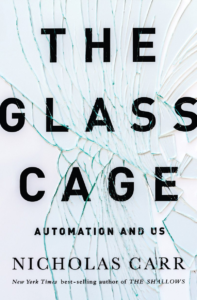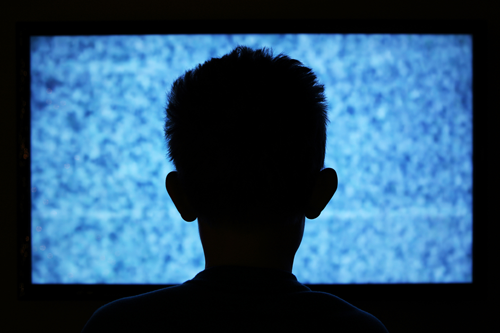 Why, you might ask, is Rewire Me reviewing Nicholas Carr’s The Glass Cage: Automation and Us, a new book about the consequences of automation by a former executive editor of the Harvard Business Review? Rewire Me isn’t about technology—its subjects are the brain, mind, and spirit. Rewire Me isn’t about business and economics but about the human quest for transformation and transcendence.
Why, you might ask, is Rewire Me reviewing Nicholas Carr’s The Glass Cage: Automation and Us, a new book about the consequences of automation by a former executive editor of the Harvard Business Review? Rewire Me isn’t about technology—its subjects are the brain, mind, and spirit. Rewire Me isn’t about business and economics but about the human quest for transformation and transcendence.
 The answer is that those are exactly the things that Carr is interested in, too. And in writing a book about the hidden costs of automation, he has made a compelling statement about what it means to be a human being—something that our rising dependence not just on mechanized labor but on machine thinking threatens to change in profound ways.
The answer is that those are exactly the things that Carr is interested in, too. And in writing a book about the hidden costs of automation, he has made a compelling statement about what it means to be a human being—something that our rising dependence not just on mechanized labor but on machine thinking threatens to change in profound ways.
To be fully human, Carr writes, is to be fully present in the world—mentally and physically, with all five senses engaged. Some of our knowledge is explicit; some is tacit. We can’t explain how we keep our balance on a bicycle; we just do. Some of our knowledge is tactile, too. A skilled woodworker feels the grain of the wood as he sands it; he hears the different sounds the paper makes as it scratches; he smells the sawdust as it starts to heat up. A machine may do the job a lot faster, but it can’t bring out the wood’s unique properties the way a craftsman can. An airline pilot feels the pull of the wind against the rudder as she grasps the stick—or at least she used to, before airplane controls were computerized.
“We think that we hate work and crave leisure, but we are happiest when we are experiencing the joy, creativity, and happiness that come, as Mihaly Csikszentmihalyi wrote in his classic book Flow, “when a person’s body or mind is stretched to its limits in a voluntary effort to accomplish something difficult and worthwhile.” “Computerization enables fewer people to do more work more efficiently and more accurately. Overall, it reduces the human errors that can cause catastrophes. But it introduces new errors, too. When a technology-dependent pilot is called upon to make the right decision instantaneously in a crisis, it may take her too long to react with speed and precision; her mind is on automatic pilot too. When a bus driver becomes dependent on a GPS device, he becomes less alert to what’s going on outside his windshield—he might not register a sign warning about a low overpass, or notice a child running out into the street. When word processing programs automatically correct our spelling, we don’t learn to spell; grammar checkers encourage us to write duller sentences. When bond traders leave the decision-making to algorithms, they become vulnerable to the kinds of Black Swan events that their software programs can’t anticipate or recognize. While computers are adept at recognizing known patterns and probabilities, they are blind to the anomalies and serendipities from which new discoveries are born.
Humans are creative; computers are dumb. When we place ourselves completely in their power—as doctors do when they fill out diagnostic questionnaires instead of giving their undivided attention to their patients’ complaints; as researchers do when they let Google supply their own search terms; as architects do when they allow CAD software instead of their own sketches to determine the emergent form of a building; as Facebook addicts do when they mistake social media for sociability—we lose as much as we gain.
“Automation severs ends from means. It makes getting what we want easier, but it distances us from the work of knowing.” “Miswanting” is a human foible. We think that we hate work and crave leisure, but we are happiest when we are experiencing the joy, creativity, and happiness that come, as Mihaly Csikszentmihalyi wrote in his classic book Flow, “when a person’s body or mind is stretched to its limits in a voluntary effort to accomplish something difficult and worthwhile.” Mere drudgery is dangerous, degrading, and soul-destroying, no doubt about it. But hard work can be the most fulfilling thing we ever do.
“One of the most remarkable things about us,” Carr writes, “is also one of the easiest to overlook: each time we collide with the real, we deepen our understanding of the world and become more fully a part of it….Automation severs ends from means. It makes getting what we want easier, but it distances us from the work of knowing.”
When we become too dependent on technology, we lock ourselves inside Plato’s cave, mistaking shadows for substance—or a glass cage, as Carr puts it, experiencing the world only as it’s mediated through screens and a machine’s perspective.
Technology can make us smarter and more productive; it opens up whole new realms of possibility. The problem is, it threatens to turn us into robots, too.
Click here to see Rose’s tips for healthy and happy relationships
Post Disclaimer
This content is for informational purposes only and does not constitute medical advice. Please consult a healthcare professional for any medical concerns.



